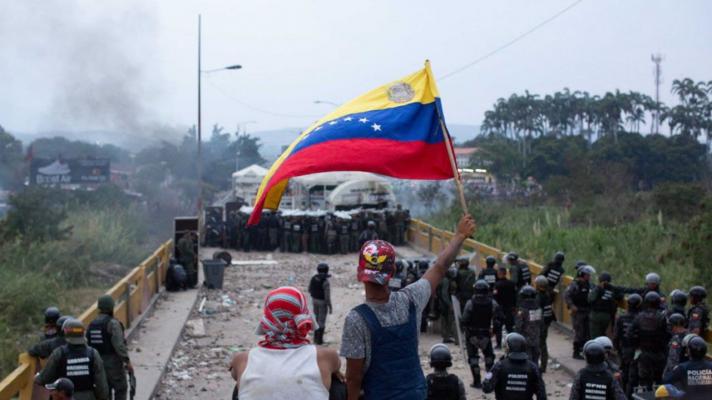In the daily brief for this February 23 by the Samuel Robinson Institute for Original Thought, a recounting and analysis of what happened two years ago on the Colombian-Venezuelan border was made, when anti-Chavismo joined the “Guaidó plan” and tried to enter Venezuela with illegal “humanitarian aid” trucks, along with a militia of armed operators, without authorization from the Venezuelan state.
We fully quote the report:
After at least three years of unilateral coercive measures, sabotage and boycotts that led to the hoarding and shortage of essential goods in the national territory, the then-new leader of anti-Chavismo, Juan Guaidó, had declared on February 12, 2019 that “on the 23rd, humanitarian aid will enter Venezuela—yes or yes, determined and decisively!”
Context. Anti-Chavismo had declared President Nicolás Maduro—re-elected in May 2018 with 67.84% of the vote—a “usurper,” because they considered the National Electoral Council, appointed by the Supreme Court of Justice, “illegitimate.”
-
The high court made the appointment because the National Assembly was in contempt.
-
Guaidó, self-proclaimed “interim president,” did not rule out authorizing a US military intervention or that of a foreign force “if necessary” to stop “the usurpation.”
The montage. On February 22 the concert “Venezuela Live Aid” was held in the border city of Cúcuta (Colombia), organized by the billionaire Richard Branson with massive propaganda. More than 30 national and international artists appeared to support the entrance of the “humanitarian aid” while the Venezuelan government blocked the border.
-
Guaidó challenged the Venezuelan government, accompanied by the presidents of Colombia, Iván Duque; from Paraguay, Mario Abdo; from Chile, Sebastián Piñera; the Secretary General of the OAS, Luis Almagro; and the United States special representative for Venezuela, Elliott Abrams.
-
In a false flag operation, three deserters from the Bolivarian National Guard seized two armored vehicles and ran over several people. Colombian authorities declared that there were up to 60 desertions from the Bolivarian National Armed Forces and the police.
On this side of the border. That same day, from Caracas, President Maduro reported that he was breaking diplomatic relations with Colombia while the Colombian government announced the withdrawal of its diplomatic personnel, who remained in Caracas even though did not recognize the Venezuelan government.
-
A group of Venezuelan protesters rejected the attempted raid, among them senior Chavista leaders, while from the mountains and under the bridge shock troops, paid for by anti-Chavismo, threw stones, Molotov cocktails and threatened Venezuela with gunfire.
-
There was a siege of military facilities and armed clashes in the city of Ureña in Tachira state. The wounded were counted by the dozens and there were four deaths.
Subsequent revelations. The self-proclaimed imposter president went to Cúcuta for the media montage. Later he was shown in photos with Alberto Lobo Quintero, alias “Brother,” financial leader of the paramilitary gang Los Rastrojos, from Colombia; with their member “Nandito” and with Jhon Jairo Durán Contreras, alias “Menor,” number two of Los Rastrojos, from whom he received help with the transfer. The images were confirmed by the Cúcuta Police and by Colombian media such as El Espectador.
-
The concert raised less than 3% of the $100 million projected for the supposed humanitarian aid.
-
Two out of the eight trucks, which were actually carrying metal wires, nails, whistles, gas masks and other items, were set on fire.
-
Subsequently, The New York Times published an audiovisual investigation in which it showed that the event was motivated by the use of Molotov cocktails launched by shock troops from the Colombian side.
Why it is important. Two years after its launch, the “Guaidó plan” was an obvious failure. However, the damages, the deaths caused by the blockade of State funds that have been placed in the hands of the “interim” imposter by the US government, and the public money lost to its corruption networks are unquantifiable. The threat of interference from the Duque administration has not ceased as Venezuela continues to overcome difficulties every day, while maintaining peace.
Translated by Orinoco Tribune
